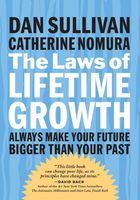
35
Law Four
Always Make Your Performance
Greater Than Your Applause
Increased performance is essential for lifetime growth. If you become more skillful and useful, you will receive greater applause from an expanding audience. This can be intoxicating, and the temptation will be to start organizing your life around other people’s recognition and praise—to keep repeating what got you the applause in the first place—rather than moving on to something new, better, and different. When this happens, the danger is that applause will become more important to you than your improved performance. The greatest performers in all fields are those who always strive to get better. No matter how much acclaim they receive, they keep working to improve their performance. Continually work to surpass everything you’ve done so far, and your performance will always be greater than your applause.
The future is always created through action, through performance. We can have an idea or a vision of a bigger future, but the idea and vision become real only when we take actions that are directly focused on achieving specific goals.
Applause resulting from performance is just a by- product. Obviously, it can be a very useful and valuable by-product, but it should never be the main focus. For a person to keep growing, the central focus always has to be the performance itself—never other people’s response to it.
36
You have control over your performance. You never have control over other people’s responses, approval, or applause. The goal here is always to be getting better; to appreciate how far you’ve come, but also to keep striving to go further, always making your future bigger than your past. A bigger future demands greater performance on your part. A bigger future requires that your skill and mastery keep improving.
Growing through Performing
The process of improving performance is where growth happens. In striving to better our performance, we engage our passions and talents, and search for ways to stretch them to new levels. Many of the obstacles we come up against require us to grow in ways that impact much more than our performance in any one area. But the desire for a better performance is what gives us the focus and motivation to take on and conquer these challenges.
Todor Kobakov admits, with a smile, that he was “a very arrogant 16-year-old,” freshly arrived in Canada from Bulgaria, when he met his piano teacher, William Aide, at the University of Toronto’s Faculty of Music. The first day he met Professor Aide, Todor told him straight out that he wasn’t interested in playing the classical piano anymore. He had no plans to become a concert pianist and was instead interested in composition and jazz. Shortly after, his attitude changed, as Professor Aide quickly helped him to see how much enjoyment and possibility for new skill development there were in playing the piano.
37
In the first two years of study, Todor gradually learned from Professor Aide that musical performance was not just about the notes and technical skill, but that it was also, and most important, a personal representation of the character of the performer. He and his fellow students began to realize that what each of them was really working on was how to become a better person, not just a better pianist—that the two went hand-in-hand. In his efforts to continue improving, Todor became more conscious of qualities in his character. Through music, he discovered some things about himself that he wanted to change, and also good qualities that he wanted to build on. This self-knowledge improved his ability to control his performances and to express himself through them in ways that told more unique and personal stories through the music.
When Todor and Professor Aide parted after four years, having developed a personal friendship along the way, his teacher said, “I think I’ve taught you how to improve yourself on your own from this point on.” Now, in his late 20s, Todor is strikingly self-possessed and articulate, with a modest wisdom that belies his age. His experience of learning how to be a better classical pianist helped him to grow into a more mature and well-rounded person during his university years. Even more important, it left him with the ability to grow continually in his life through the act of pursuing better and better performances. He says he still likes to play certain pieces every few years that he hasn’t played in a long time, because the way he performs them differently now shows him how he has changed as a person.